10 Absolute Worst Ways To Die According To Science
The very worst ways to make an exit, ranked.

Most people don't really like to think about it, but we've all got to die someday.
As with most things, some ways are better than others. The reality is that, if you're very lucky, you'll end your days in bed, surrounded by your loved ones, off your head on painkillers. The joy of modern medicine is that we can now even end our lives in relative comfort.
This is one end of the spectrum and, sadly, the rest of it isn't quite so pleasant. It's obviously pretty difficult to study the sensation of death, seeing as the majority of people who have experienced it are currently unavailable for comment.
This hasn't stopped scientists from trying to extrapolate from what we know about the limitations of the human body and our tolerance for pain, injury and deprivation (they're a cheery bunch).
So, in the unlikely event that you get a choice in the matter, what are the worst (read: most painful) ways to shuffle off the mortal coil?
10. Starvation

It may not surprise you to learn that starving to death is no picnic (no pun intended).
It's actually relatively difficult to starve to death, and is in no way a quick end. Your body has evolved over millions of years to weather periods of feast and famine, and will make adjustments accordingly if the food stops rolling in. To a certain point anyway.
We all know from Dieting 101 that, when faced with starvation, the body will burn through its fat stores for energy. Once that runs out, it will go for the muscle but, eventually, it's going to run out of options.
The extreme lack of vitamins and minerals will likely lead to a severely weakened immune system. It might be this, as opposed to exclusively starvation, that eventually finishes you off as you would have little defence against all kinds of diseases.
If an infection doesn't get you, then you face a period of extreme fatigue and listlessness due to insufficient electrolyte levels, followed by cardiac arrest as a result of tissue degradation (basically, your body starts to metabolise your heart).
You might not even feel hungry during end-stage starvation. Studies have shown that those who are about to die anyway, often from terminal disease, will enter a different kind of starvation mode in which the body just shuts down and switches off the "hunger pangs" that we might expect. This is fine if you're "ready to go", but you can bet that most of the people currently starving to death definitely aren't.